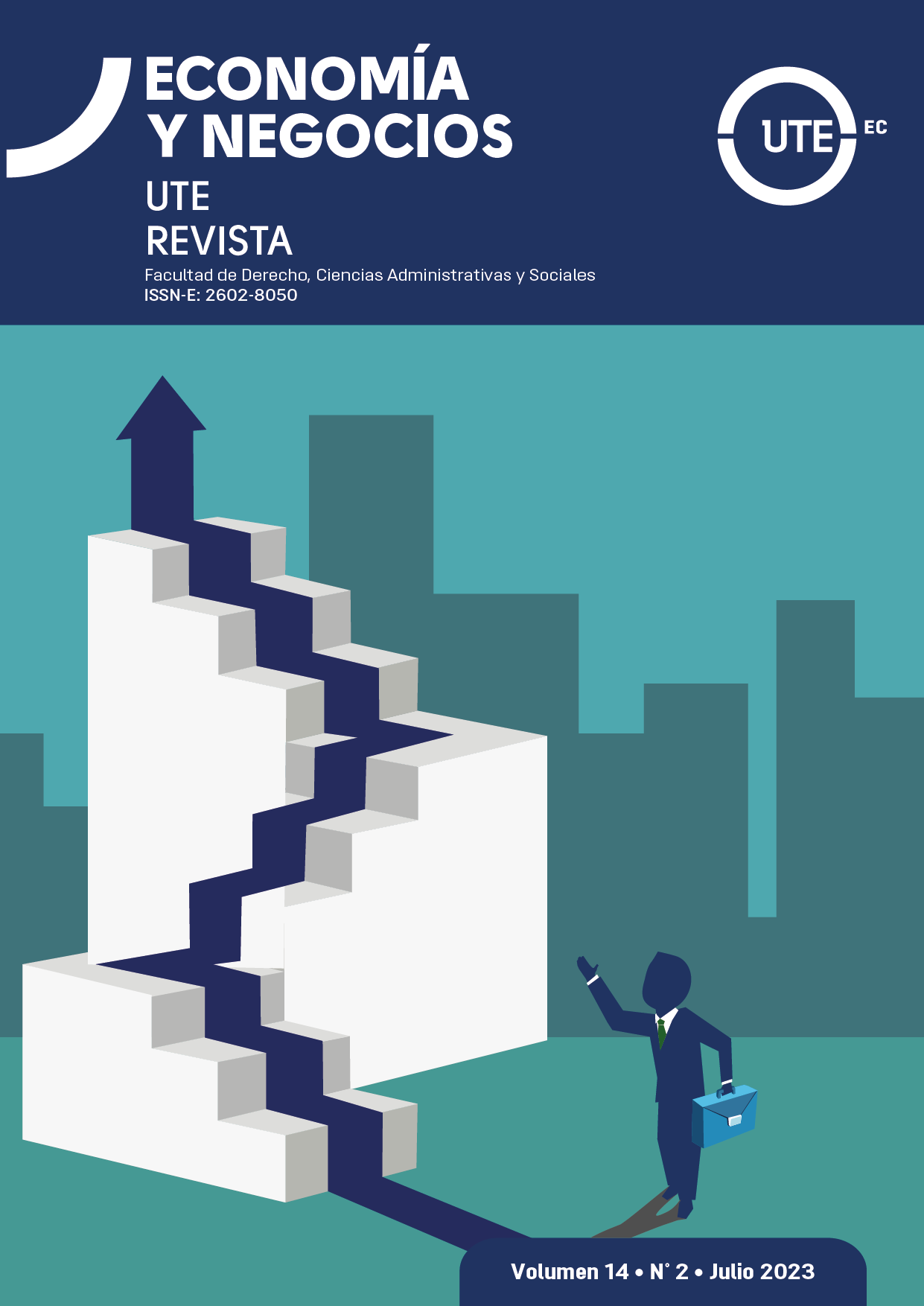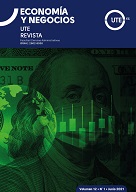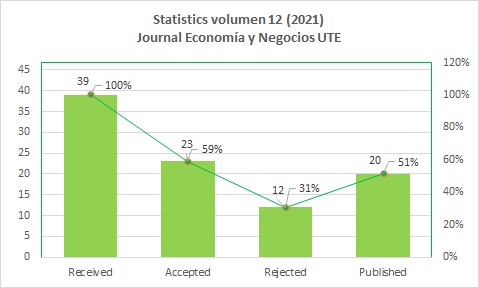Economic and Political Stability for Latin America
DOI:
https://doi.org/10.29019/eyn.v14i2.1148Keywords:
Economic growth, Social instability, Political instability, Development, EcuadorAbstract
The dawn of the 21st century has generated several crossroads in the political, economic, social, technological and even academic spheres; Hence, in Latin America there is a power struggle based on partisan interests and its consequent departure from an objective vision of the future for the development and consolidation of a society that aspires to boost its employment situation and the precepts of strengthening a generation of entrepreneurs, who for obvious reasons, they could open the path necessary for the entrepreneurial drive. The strategies proposed in the government plans of the countries of the region have been reconsidered after the presence of Covid-19, seeking to repower their political and economic processes in the face of high levels of external indebtedness, inflationary pressures, and an increase in organized crime, and the possibility of establishing links with first world economies.
Part of the analysis reflects that by 2023 the outlook for the region is not very encouraging; however, each country has its own political-economic management based on a reality that is similar in high levels of inflation, accelerated migratory crisis, increase in violence, political disarticulation and increase in extreme poverty; all this, in the face of limited social development plans that in the short or medium term could provide the minimum guidelines necessary for the complex moment they are going through, to allow the establishment of plans based on strategies of social and political maturity.
Downloads
References
Acosta, S., Adler, G., Goldfajn, I., & Ivanova, A. (2022). Crecimiento económico. FMI. https://bit.ly/43brcA7
Acosta-Palomeque, G., Pazmiño-Arroyo, H., & Cerda-Prado, N. (2018). Inversión Extranjera Directa, Exportaciones y Crecimiento Económico en América Latina. Economía y Negocios, 9(2), 14–25. https://doi.org/10.29019/eyn.v9i2.502
ADEN. (2022, junio 23). Ranking ADEN de Competitividad: ¿Cuál es la realidad de América Latina? ADEN Business Magazine. https://bit.ly/42fp2ya
Adler, G., Chalk, N., & Ivanova, A. (2023, febrero 3). América Latina enfrenta un crecimiento más lento e inflación alta en medio de tensiones sociales. Para restaurar la estabilidad macroeconómica y estimular el crecimiento se precisarán políticas cuidadosamente formuladas que ayuden a aliviar el descontento. IMF Blog. https://bit.ly/41XYhOA
Aguado-Franco, J. C. (2023). Aversión al riesgo, efecto certeza y estimación de probabilidades. Retos Revista de Ciencias de la Administración y Economía, 13(25), 49-60. https://doi.org/10.17163/ret.n25.2023.04
Angulo, S. (2023, marzo 26). Concesionaria denunció el robo de 24 autos en Quito. Expreso. https://bit.ly/43l2ehH
Appendino, M., Goldfajn, I., & Pienknagura, S. (2022, abril 18). América Latina sufre un shock inflacionario tras otro. FMI. https://bit.ly/3MHikeC
Banco Mundial. (2022, septiembre 14). El Banco Mundial hace un llamado urgente a la acción climática en América Latina y el Caribe para acelerar la transición hacia economías resilientes y bajas en carbono. https://bit.ly/3WJzBbS
Barría, C. (2022, diciembre 26). Los países con la inflación más baja y más alta de América Latina en 2022 (y qué se espera para 2023). BBC News Mundo. https://bit.ly/3Wm3rTv
Batthyány, K. (2020). Por un nuevo pacto social en América Latina. El Correo de la Unesco, 21-23. https://bit.ly/45robgG
Berthin, G. (2022, septiembre 15). Sobre La Resiliencia Democrática. Democratic Governance. https://bit.ly/42cL059
Boutros-Ghali, B. (2003). La interacción entre Democracia y Desarrollo. Informe de síntesis. UNESCO. https://bit.ly/43tIg47
Castellanos, R. (2020, octubre 30). ¿Qué es un Régimen Híbrido? El Orden Mundial. https://bit.ly/3ozC6Rm
CEPAL. (2022, noviembre 15). El mundo alcanza los 8 mil millones de habitantes, de los cuales 662 millones viven en América Latina y el Caribe. Población y Desarrollo-CEPAL. https://bit.ly/3MK6n9c
CEPAL. (2023, abril 20). Economías de América Latina y el Caribe crecerán 1,2% en 2023 en un contexto de crecientes incertidumbres. CEPAL. https://bit.ly/3BX8fW0
Dávila-Toro, L. A. (2021). Crecimiento Económico y Evolución de las Finanzas Públicas en El Ecuador: Periodo 2008-2020. Economía y Negocios, 12(2), 103–115. https://doi.org/10.29019/eyn.v12i2.974
Ferraz, J., Kupfer, D., & Haguenauer, L. (1996). Made in Brazil: desafíos competitivos para la industria. Campus.
Insight Crime. (2023, mayo 19). InSight Crime's Chemical Precursor Report continues to be a reference in the region. https://bit.ly/3pZ6Knu
Medeiros, V., Gonçalves, L., & Camargos, E. (2019). La competitividad y sus factores determinantes: un análisis sistémico para países en desarrollo. Revista de la CEPAL, (129), 8. https://bit.ly/3OLFbsj
Sahd, J. y Zovatto, D. (2023). Riesgo Político América Latina 2023. CEIUC.
Transparency International. (2023, enero 31). El índice de percepción de la corrupción 2022 revela escasos avances contra la corrupción en un contexto mundial cada vez más violento. Transparency International. https://bit.ly/3om4Ug1
Touraine, A. (1990). El duro camino a la democracia. El Correo de la Unesco, 19-26. https://bit.ly/3OJY3I2
Touraine, A. (1992). ¿Qué es la democracia? El Correo de la Unesco, 8-12. https://bit.ly/45B39fS
Torcal Loriente, M. (2023, enero 25). Sobre la resiliencia democrática. El País. https://bit.ly/3WFxDt6
World Visión. (2023, mayo 16). Informe de situación de la respuesta a la crisis de Venezuela. World Vision. https://bit.ly/3WBpjdw
Published
How to Cite
Issue
Section
License
Copyright (c) 2023 The Authors

This work is licensed under a Creative Commons Attribution 4.0 International License.
The articles and research published by the UTE University are carried out under the Open Access regime in electronic format. By submitting an article to any of the scientific journals of the UTE University, the author or authors accept these conditions.
The UTE applies the Creative Commons Attribution (CC-BY) license to articles in its scientific journals. Under this open access license, as an author you agree that anyone may reuse your article in whole or in part for any purpose, free of charge, including commercial purposes. Anyone can copy, distribute or reuse the content as long as the author and original source are correctly cited. This facilitates freedom of reuse and also ensures that content can be extracted without barriers for research needs.
Creative Commons Attribution 4.0 International License
The Journal Economía y Negocios is distributed under a
Creative Commons Attribution 4.0 International (CC BY 4.0).

In addition, the journal Economía y Negocios guarantees and declares that authors always retain all copyrights to the original published works without restrictions [© The Author(s)]. Acknowledgment (BY): Any exploitation of the work is allowed, including a commercial purpose, as well as the creation of derivative works, the distribution of which is also allowed without any restriction.















